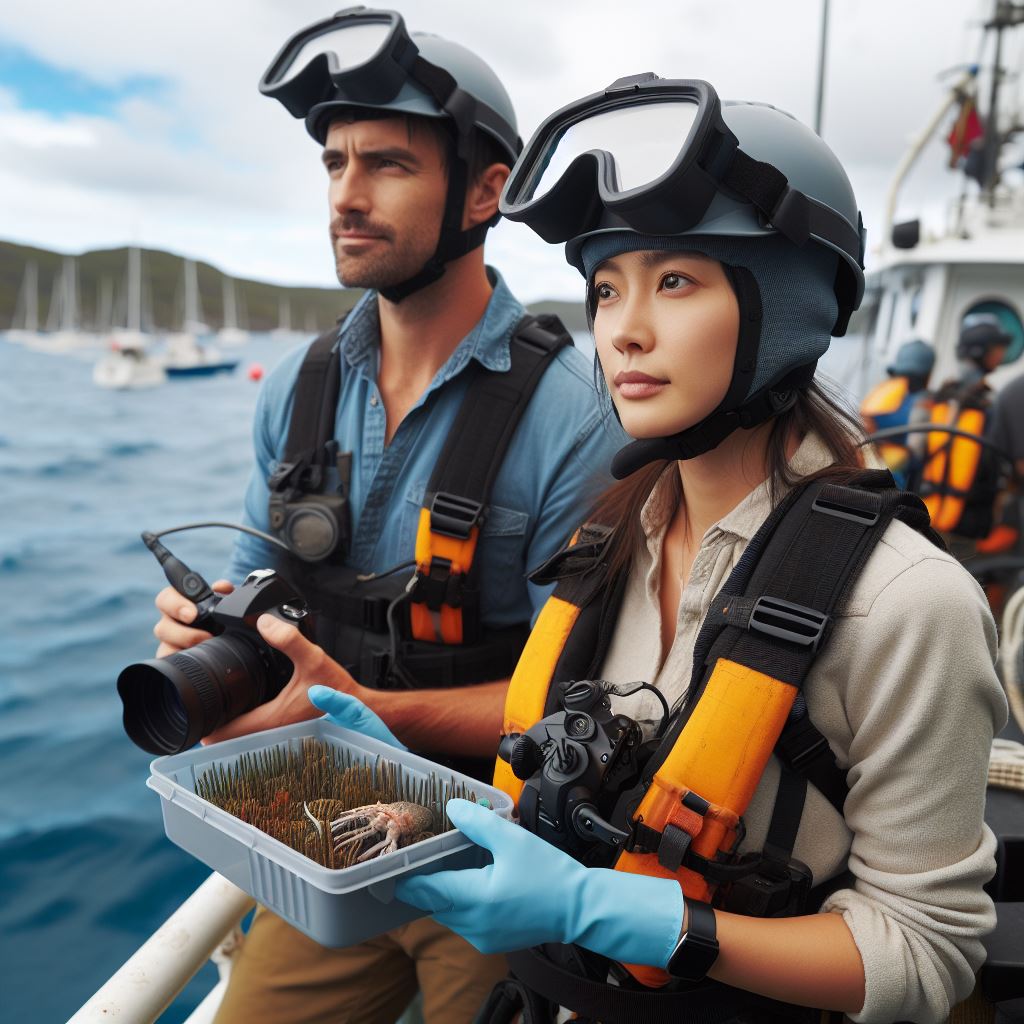Introduction
In the field of marine biology, a set of key skills is fundamental for successful research and conservation. These skills encompass various aspects of scientific inquiry and practical application in marine environments.
Let’s explore these essential competencies that marine biologists require to thrive in their profession.
Firstly, a solid understanding of biological principles forms the basis of marine biology. Proficiency in subjects like ecology, genetics, and physiology enables researchers to comprehend the intricate relationships within marine ecosystems.
Fieldwork proficiency is crucial for conducting research in diverse marine habitats. Marine biologists need practical skills for specimen collection, habitat assessment, and biodiversity surveys during field expeditions.
Data collection and analysis skills are essential for interpreting research findings. Marine biologists must design sound methodologies, collect accurate data, and employ statistical analyses to derive meaningful insights from their studies.
Effective communication skills are vital for sharing research findings and engaging stakeholders in conservation efforts. Clear communication helps bridge the gap between scientific knowledge and public understanding.
Problem-solving and critical thinking abilities enable marine biologists to address complex challenges in marine conservation. Creative thinking allows for the development of innovative solutions to environmental issues.
Teamwork and collaboration are integral to successful marine conservation initiatives. Collaborative efforts among scientists, policymakers, and local communities maximize the impact of conservation projects.
Lastly, a commitment to ongoing learning and professional development ensures that marine biologists stay informed about emerging research trends and conservation strategies.
These key skills equip marine biologists to contribute meaningfully to the understanding and preservation of marine ecosystems.
Scientific and Research Skills
Familiarity with scientific methods and protocols
To succeed in marine biology, one must have a solid understanding of scientific methods and protocols.
Proficiency in data collection and analysis
Being able to effectively collect and analyze data is crucial in marine biology research.
Knowledge of laboratory techniques and equipment
Having knowledge of different laboratory techniques and equipment is essential for scientific experiments and analyses.
Ability to conduct field research and sample collection
Field research and sample collection yield crucial firsthand knowledge and data in marine biology research.
Marine biologists require a spectrum of key skills for success in their field.
Proficiency in scientific methods and protocols ensures structured and valid research.
Your Personalized Career Strategy
Unlock your potential with tailored career consulting. Get clear, actionable steps designed for your success. Start now!
Get StartedData collection and analysis skills are essential for drawing meaningful insights from research findings.
Understanding laboratory techniques and equipment facilitates accurate analysis of samples.
Field research allows for the study of marine organisms and their habitats.
Acquiring and refining these skills empowers marine biologists to contribute significantly to marine ecosystem understanding.
Biological Knowledge and Understanding
A successful career in marine biology requires a strong foundation of biological knowledge and understanding. Here are some key skills that are essential for any aspiring marine biologist:
Understanding of marine ecosystems and biodiversity
- Ability to comprehend the intricate relationships and interactions within marine ecosystems.
- Knowledge of the various components of marine ecosystems, including the biotic and abiotic factors.
- Understanding the concept of biodiversity and its importance in maintaining healthy marine ecosystems.
- Familiarity with different types of marine habitats, such as coral reefs, estuaries, and deep-sea environments.
- Ability to identify and classify different species within marine ecosystems.
Knowledge of marine organisms and their habitats
- Familiarity with the characteristics, adaptations, and life cycles of major groups of marine organisms.
- Understanding the physiological processes and behaviors of marine organisms.
- Knowledge of the specific requirements and preferences of different marine species for their habitats.
- Awareness of the ecological roles and functional significance of different marine organisms in their respective habitats.
- Ability to conduct field surveys and data collection to study marine organisms and their habitats.
Familiarity with marine conservation and management principles
- Understanding the importance of marine conservation and the need to protect marine ecosystems.
- Knowledge of the major threats and challenges facing marine biodiversity and ecosystems, such as pollution, overfishing, and climate change.
- Understanding the principles and practices of sustainable fisheries management and marine protected areas.
- Awareness of national and international policies and regulations related to marine conservation and management.
- Ability to contribute to conservation initiatives and develop management plans for the sustainable use of marine resources.
In general, in order to excel in the field of marine biology, it is crucial to possess a strong foundation of biological knowledge and understanding.
This includes having a deep understanding of marine ecosystems and biodiversity, knowledge of marine organisms and their habitats, as well as familiarity with marine conservation and management principles.
With these skills, marine biologists can contribute to the conservation and sustainable management of our precious marine resources.
Environmental Awareness and Sustainability
Understanding of the impact of human activities on marine ecosystems
Human activities can have detrimental effects on marine ecosystems, such as pollution, overfishing, and habitat destruction.
Knowledge of environmental regulations and policies
Having knowledge of environmental regulations and policies is essential to ensure compliance and protect marine ecosystems.
Ability to assess and mitigate environmental risks
Marine biologists need to be able to identify and assess potential environmental risks and develop strategies to mitigate them.
Commitment to promoting sustainability in marine biology practices
Marine biologists must champion sustainability, understanding its importance in mitigating harm to vulnerable marine ecosystems.
In the realm of marine biology, a deep comprehension of environmental impacts from human activities is crucial.
Human actions, like pollution and overfishing, pose severe threats to marine ecosystems, demanding marine biologists’ comprehensive understanding.
Proficiency in environmental regulations equips marine biologists to safeguard marine ecosystems by enforcing restrictions and endorsing responsible practices.
Assessing and mitigating environmental risks, such as oil spills, necessitates scientific expertise and adept problem-solving skills.
Stand Out with a Resume That Gets Results
Your career is worth more than a generic template. Let us craft a resume and cover letter that showcase your unique strengths and help you secure that dream job.
Get HiredChampioning sustainability involves advocating for practices that meet current needs without jeopardizing future generations’ ability to meet their own.
Staying abreast of the latest research and best practices empowers marine biologists to actively contribute to sustainability.
Ultimately, marine biologists play a vital role in environmental conservation by prioritizing sustainability and promoting awareness, safeguarding marine ecosystems.
Communication and Collaboration Skills
In the field of marine biology, effective communication and collaboration skills are essential for success. It is not enough to conduct groundbreaking research and make important discoveries; scientists must also be able to effectively communicate their findings to others.
This section will discuss the key skills needed in communication and collaboration in marine biology.
Effective verbal and written communication skills
The ability to communicate clearly and effectively through both verbal and written means is crucial in marine biology.
Scientists need to be able to explain complex concepts in a way that is easily understood by colleagues, students, and the general public. This requires strong speaking and writing skills.
Ability to present research findings clearly and concisely
Presenting research findings is a critical aspect of being a marine biologist. Whether it is presenting at conferences, seminars, or in academic publications, scientists must be able to clearly and concisely convey their findings to others.
This involves organizing information in a logical manner and using visual aids effectively.
Proficiency in scientific writing and publishing
Marine biologists often publish their research in scientific journals. Therefore, it is essential to have proficiency in scientific writing and publishing.
This includes understanding the structure and style of scientific papers, as well as being able to effectively communicate research methodologies and findings.
Collaboration and team-working skills
Collaboration is common in the field of marine biology, as many research projects require the expertise of multiple scientists and institutions. Therefore, having strong collaboration and team-working skills is crucial.
This involves being able to work well with others, share responsibilities, and contribute effectively to a team.
Ability to communicate with diverse stakeholders, including policymakers and the public
Marine biologists often work with a wide range of stakeholders, including policymakers, government agencies, and the public. Therefore, the ability to communicate effectively with diverse audiences is important.
Scientists must be able to translate scientific jargon into layman’s terms and convey the significance of their research to different groups.
Generally, communication and collaboration skills are vital in the field of marine biology.
Effective verbal and written communication skills, the ability to present research findings clearly, proficiency in scientific writing and publishing, collaboration and team-working skills, and the ability to communicate with diverse stakeholders are all crucial for success in this field.
Read: Must-Attend Chemistry Conferences in Aus

Technical and IT Skills
Proficiency in using specialized marine biology software and tools
One of the key skills needed in marine biology is proficiency in using specialized software and tools specifically designed for this field. These tools and software are essential for conducting research, data analysis, and modeling in marine biology.
Marine biologists utilize various software and tools to study and analyze marine organisms, their behavior, and their habitats.
Examples of specialized marine biology software include programs for tracking underwater movements of marine animals, analyzing water quality, and simulating underwater ecosystems.
Proficiency in using these specialized marine biology software and tools is crucial because they enable marine biologists to collect accurate data, analyze it effectively, and draw meaningful conclusions.
It is essential for marine biologists to stay updated with the latest advancements in these software and tools to maximize their productivity and efficiency in their research.
Transform Your LinkedIn for Maximum Impact
Elevate your professional brand with a LinkedIn profile that attracts recruiters, showcases your expertise, and maximizes opportunities. Stand out in your industry with a profile built for success.
Boost ProfileFamiliarity with geographic information systems (GIS)
In addition to specialized marine biology software, marine biologists also need to be familiar with geographic information systems (GIS).
GIS allows them to gather, manage, and analyze spatial data related to marine environments, including maps, satellite images, and aerial photographs.
Familiarity with GIS enables marine biologists to integrate various layers of information, such as marine species distribution, water temperature, and ocean currents, to understand the complex interactions and dynamics of marine ecosystems.
GIS is particularly useful in marine biology research as it helps in identifying critical habitats, predicting species distributions, and assessing the impact of human activities on marine ecosystems.
Therefore, having a working knowledge of GIS is highly beneficial for marine biologists in their data analysis and research work.
Ability to analyze and interpret geospatial data
Along with proficiency in specialized marine biology software and familiarity with GIS, marine biologists should possess the ability to analyze and interpret geospatial data.
Geospatial data includes information on the spatial distribution, characteristics, and relationships of various components of marine ecosystems.
Being able to analyze and interpret geospatial data allows marine biologists to identify patterns, trends, and correlations within the data, which are essential for understanding ecological processes and making informed decisions in marine conservation and management.
By analyzing geospatial data, marine biologists can determine key environmental factors affecting the distribution of marine organisms, monitor changes in their habitats, and assess the effectiveness of conservation efforts.
Understanding of remote sensing technologies
Finally, a key technical skill needed in marine biology is an understanding of remote sensing technologies. Remote sensing involves the collection of information about objects or areas from a distance, typically through the use of satellites, aircraft, or drones.
Marine biologists can utilize remote sensing technologies to gather data on various aspects of marine environments, such as sea surface temperature, chlorophyll concentration, and habitat characteristics.
This information is then used to monitor changes in marine ecosystems and study the impacts of climate change.
Having an understanding of remote sensing technologies allows marine biologists to effectively utilize data obtained from remote sensing platforms, like satellites, and extract valuable information to support their research and conservation efforts.
Essentially, technical and IT skills play a vital role in marine biology.
Marine biologists need to be proficient in using specialized marine biology software and tools, familiar with GIS, able to analyze and interpret geospatial data, and possess an understanding of remote sensing technologies.
Developing and honing these skills empower marine biologists to conduct research, understand marine ecosystems, and contribute to their conservation and management.
Read: Innovative Chemistry Startups in Australia
Problem-Solving and Critical Thinking Skills
A successful marine biologist possesses a range of problem-solving and critical thinking skills that enable them to navigate the complex world of marine biology.
These skills are essential for identifying research gaps, interpreting data sets, and solving problems related to marine conservation and sustainability.
Ability to Identify Research Gaps and Formulate Research Questions
One of the key skills needed in marine biology is the ability to identify research gaps and formulate research questions. This skill requires a critical eye and a deep understanding of the field.
By identifying research gaps, scientists can determine areas where new knowledge is needed and contribute to the advancement of marine biology.
Formulating research questions involves formulating specific and testable inquiries that address the identified research gaps. These questions serve as a guide for conducting studies and provide a clear focus for research projects.
By asking the right questions, marine biologists can make significant contributions to the scientific understanding of marine ecosystems.
Analytical Skills for Interpreting Complex Data Sets
Marine biologists deal with vast and complex data sets derived from various research methods such as field surveys, laboratory experiments, and remote sensing technologies. To make sense of this wealth of information, analytical skills are crucial.
These skills enable marine biologists to analyze and interpret data effectively, identifying patterns, trends, and relationships.
By employing statistical tools and modeling techniques, they can extract meaningful insights from these data sets and draw scientifically sound conclusions.
Capability to Solve Problems Related to Marine Conservation and Sustainability
Marine conservation and sustainability are major concerns in today’s world. Marine biologists play a critical role in addressing these issues by developing solutions and implementing effective strategies.
Problem-solving skills are essential for marine biologists in tackling challenges such as overfishing, habitat destruction, pollution, and climate change.
They must be able to assess the root causes of these problems, analyze the potential impacts, and devise innovative approaches to mitigate or solve them.
Furthermore, critical thinking skills are crucial for evaluating the effectiveness of conservation measures and ensuring long-term sustainability.
Marine biologists must be able to assess the ecological, social, and economic implications of different conservation strategies and make informed decisions based on sound scientific evidence.
Essence, problem-solving and critical thinking skills are vital for marine biologists.
These skills enable them to identify research gaps, formulate research questions, interpret complex data sets, and solve problems related to marine conservation and sustainability.
By honing these skills, marine biologists contribute to the advancement of knowledge and the protection of our oceans.
Read: Navigating Chem Grad Studies in Australia
Delve into the Subject: Lab Tech Internships in Australia
Discover More: AU Research Grants: How To Succeed
Gain More Insights: Biology Fieldwork in Australia: What to Expect
Adaptability and Resilience
In the field of marine biology, adaptability and resilience are crucial skills for success.
Marine biologists often find themselves working in challenging and diverse marine environments, requiring them to be able to adapt quickly and effectively. Here are some key aspects of adaptability and resilience in marine biology:
Capacity to work in challenging and diverse marine environments
- Marine biologists must have the ability to work in a variety of marine habitats, ranging from coral reefs to deep-sea trenches.
- They should be comfortable working in extreme conditions such as strong currents, rough seas, and harsh weather.
- Adaptability is also important when it comes to different types of dives, including SCUBA diving and submersible dives.
- Marine biologists must be able to quickly acclimate to different environmental conditions and adjust their research methods accordingly.
Flexibility to adapt research methodologies based on field conditions
- Field conditions can often be unpredictable, with variables such as weather, water clarity, and marine life behavior.
- Marine biologists need to be flexible and open-minded, willing to modify their research methodologies on the go.
- This may involve changing sampling techniques, data collection methods, or even research objectives based on the current conditions.
- The ability to think on their feet and make quick decisions is crucial in adapting research methodologies effectively.
Emotional resilience to handle setbacks and overcome obstacles
- In the field of marine biology, setbacks and obstacles are bound to occur during research projects.
- Equipment failures, data loss, or unexpected challenges can often lead to frustration and disappointment.
- Marine biologists must have emotional resilience to handle these setbacks and continue working towards their goals.
- They should be able to bounce back from failures and learn from their experiences, without losing motivation.
- Resilience is particularly important when working on long-term projects that require dedication and perseverance.
In review, adaptability and resilience are essential skills for marine biologists. By being adaptable, they can navigate diverse marine environments and adjust their research methodologies based on field conditions.
Emotional resilience allows them to handle setbacks and overcome obstacles, ensuring continued progress in their work. These skills are fundamental for success in the ever-changing and challenging field of marine biology.
Read: Australian Marine Life: A Study Guide
See Related Content: Key Skills for Aspiring Australian Eco-Scientists
Uncover the Details: Chemistry Internships: A Guide for Aussies
Conclusion
Recap of key skills needed in marine biology
- Proficiency in scientific research and data analysis
- Strong understanding of marine ecosystems and biodiversity
- Excellent communication and teamwork skills
- Ability to adapt and problem solve in challenging environments
Emphasis on the importance of continuous learning and personal development
- Marine biology is a field that is constantly evolving, requiring professionals to stay updated.
- Continuous learning allows for new discoveries and advancements in the field.
Encouragement for aspiring marine biologists to enhance their skill set
- Pursue higher education and gain practical experience through internships and fieldwork.
- Join professional organizations and attend conferences to network and learn from experts.
In closing, a career in marine biology demands a wide range of key skills, including research, communication, adaptability, and problem-solving.
Continuous learning and personal development are essential to stay current in this dynamic field. To become a successful marine biologist, aspiring individuals should strive to enhance their skill set through education, hands-on experience, and networking opportunities.




